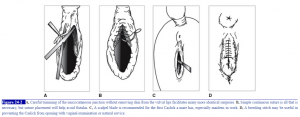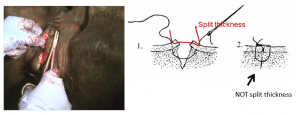Female urogenital surgery
How to – Caslick’s suture
Indications
A Caslick’s suture is used in mares to treat urine pooling, vulvar trauma, pneumovagina, vaginitis and infertility.
A deep (thick) Caslick’s may be used as a permanent means of preventing vaginal prolapse.
Relevant anatomy
The vulvar lips comprise the first barrier to the uterus. If the vulvar lips do not seal totally, a Caslick’s suture is placed to create the seal.
Preoperative management
Food restrictions: NA
NSAIDs/analgesics: NSAIDs are recommended preoperatively.
Antibiotics:NA
Tetanus prophylaxis is recommended.
Local blocks: Typically a line block on each side of the vulva is performed.
Position/preparation: The patient is sedated as needed and restrained in stocks (mares) or headgates (cattle). Sterile gloves are recommended.
Surgery Supplies:
- Scalpel blade and handle
- Metzenbaums
- Suture scissors
- 2-0 suture on a cutting needle
Surgical procedure
A thin strip of tissue is removed from each side of the vulva at the mucocutaneous junction, extending from the dorsal junction to the pelvic brim (approximately 2/3 of the length). Alternatively, instead of removing a strip of tissue, the vulvar lips can be incised only, creating a fresh edge (saves tissue). The cut edges are sutured together using a split thickness Ford Interlocking or continuous pattern of 2-0 absorbable or nonabsorbable suture material. Due to the local block, bites should be taken closely together (1/2 cm) and pulled snugly to prevent gaps.


Postoperative care
- Sutures are removed in 10-14 days.
- Episiotomy (cut the Caslick’s) is performed to open the Caslick’s prior to parturition
Complications
- Gaps may develop between the vulvar lips if the suture pattern is too loose.
- Natural breeding with the vulvar lips closed can lead to trauma to the mare and/or stallion
- Foaling through the closed vulva can lead to trauma to mare and/or foal
- Each time the Caslick’s is replaced, it becomes thicker and harder to create a seal.
Videos
Equine Caslicks – with poor instrument handling but nice visuals

